Keyword Intent in SEO
It’s a standard industry term. Almost everyone that has heard of SEO knows of “keywords”. The problem is, the general perception of keywords is out of date! Worse – there’s no alternative and few additional terms! Also, People are not using the right marketing tools to implement SEO. Originally, Keywords were THE thing. Meta Keywords and string matching. Other sites came along, things evolved, Meta-Keywords basically died. Yet the term remained. Though how they are used has evolved, the way they are used for research hasn’t really. As competition for “keywords” got harder, new terms came:
* Head term
* Longtail
* And then Mid-tail joined in
As more businesses went online, and more sites, pages, and content appeared – it became harder to rank for the shorter “keywords”. Also, People are not aware of the right link-building tactics in SEO, & some amazing SEO tools which is quite a bit obstacle for ranking.
- Based on data from Moz (rounded off), * Head terms = 20% * Midterms = 10% * Longtail terms = 70% Head terms are often the most costly, competed, with the greatest volume of matches and ambiguity. Longtails are the most specific and greatest converting.
FAQ’s About Keywords In SEO
What is a keyword in an SEO, with example?
What is the role of keywords in search engines?
What are the examples of keywords in SEO?
How do I choose keywords for my content?
How do keywords affect SEO?
What are Head Terms?
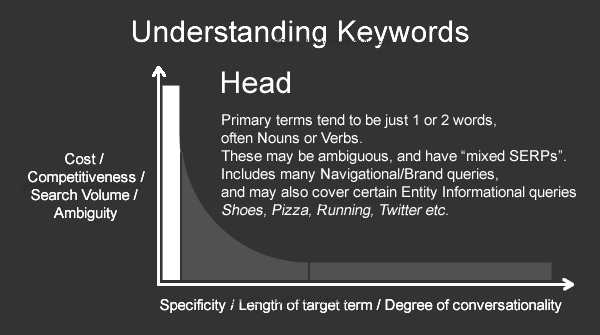
Primary terms tend to be 1 or 2 words, often Nouns or Verbs. These may be ambiguous, and have “mixed SERPs”. Includes many Navigational/Brand queries, and may also cover certain Entity Informational queries
Example: Shoes, Pizza, Running, Twitter, etc.
What are Mid Terms?
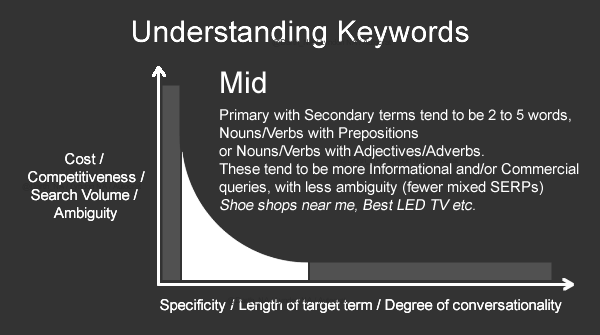
Primary with Secondary terms tend to be 2 to 5 words, Nouns/Verbs with Prepositions or Nouns/Verbs with Adjectives/Adverbs. Often more Informational and/or Commercial queries, with less ambiguity (fewer mixed SERPs).
Example: Shoe shops near me, Best LED TV, etc.
What are Long Tail Terms?
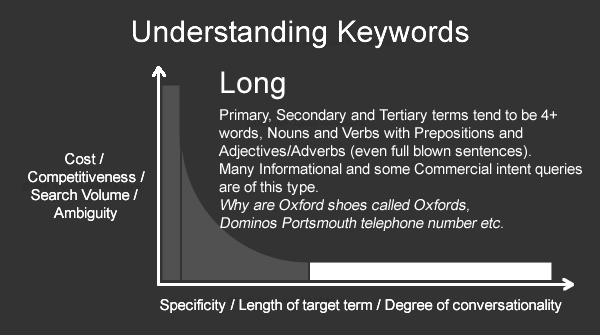
Primary, Secondary and Tertiary terms tend to be 4+ words, Nouns & Verbs, Prepositions & Adjectives/Adverbs (even full sentences). Many Informational and some Commercial intent queries are of this type.
Example: Why are Oxford shoes called Oxfords?
Tips & Tricks – Which Keyword To Target?
The longer the term you target, the more distinctive, specific, and unambiguous it is, the fewer pages you should need to produce to be relevant for it, and fewer internal/inbound links.20
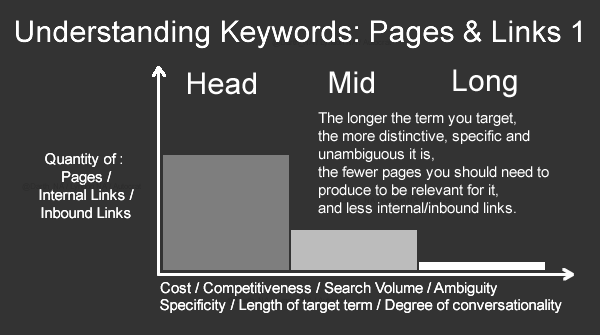
The shorter, less detailed the term you want to rank for, the more pages you will need, with more internal links and inbound links pointing to it. (Head/Hub pages)
Each page is meant to target the main term, or set of terms (see “group”) If you produce “topic expanding” content, you will naturally have pages that include the same “root” term. (Not really cannibalizing!)
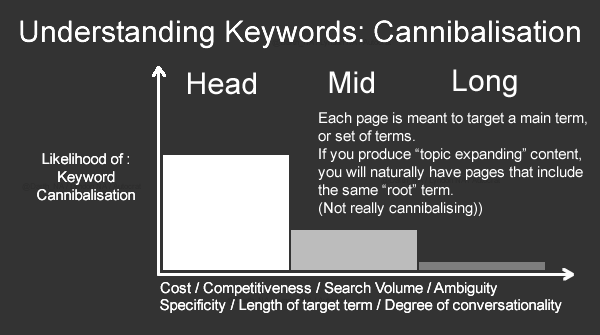
Each page is meant to target a specific thing. This can be by Variant, Target, or Intent. Variants differentiate by features. Targets differentiate by audience attributes. Intents by nature/purpose.
Understanding the Keywords SERP Nature With Example
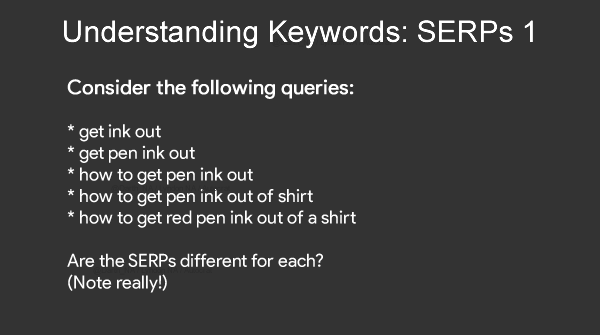
Consider the following queries:
* get ink out
* get pen ink out
* how to get pen ink out
* how to get pen ink out of the shirt
* how to get red pen ink out of a shirt Are the SERPs different for each?
As you can see, the number of words may change – the nature and topic do not. The order of results may shuffle, but the majority of results are on the same page.
Note the SERP changes, which version triggers ads and where and the Featured Snippets.
Also, notice that we didn’t really need “how-to” in the query? can imply it by removing it – quite safely, as there’s very little chance for ambiguity. (There isn’t a lot of content about “why to remove ink” etc. :D) Shows how/why researching competition is important!
What are Ambiguous Queries?
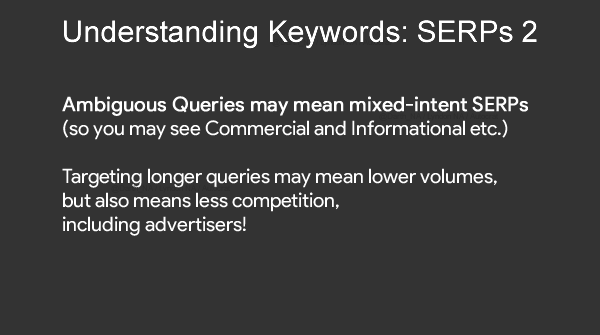
Ambiguous Queries may mean mixed-intent SERPs (so you may see Commercial and Informational etc.) Targeting longer queries may mean lower volumes, but also means less competition, including advertisers!
Example
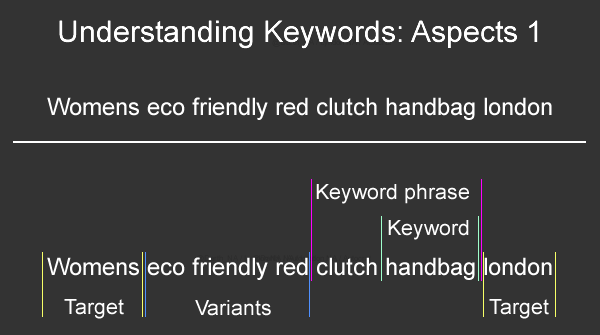
Query: women’s eco-friendly red clutch handbag London
https://google.com/search?q=womens+eco+friendly+red+clutch+handbag+london…
Keyword: handbag
Keyword phrase: clutch handbag
Target terms: Women(s) and London
Variants: eco friendly and red
Intent: Implied (product, so it’s primarily commercial)
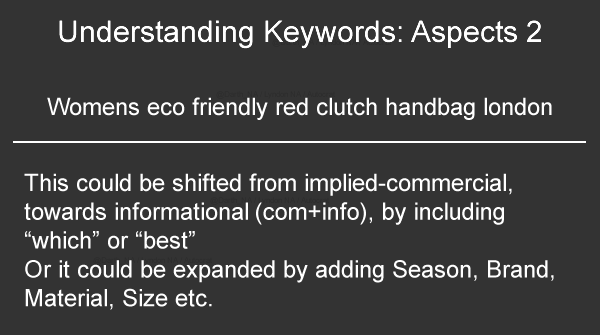
[Women’s eco-friendly red clutch handbag london]
This could be shifted from implied-commercial, towards informational (com+info), by including “which” or “best” Or the results could be refined by adding Season, Brand, Material, Size, differentiators (sequins?), etc.
Next up is Keyword “nature” (classification)
We know that Google classifies queries. We don’t know if that includes types/specifics of Intent, but we do know it covers Adult and YMYL! Certain words/phrases will trigger different behavior (poss. inc. anti-spam Algo. )
Then we have Keywords “groups”
Some words have abbreviations and/or variant spellings etc. There are also synonyms, similar terms, and descriptors. So any “keyword” may actually cover a range of variant phrases. (And a page may show several “phrases”, and their variants!)
[women’s eco-friendly red clutch handbag london]
eco friendly ?= sustainable | recycled | green
red ?= ‘’ | scarlet | burgundy | strawberry
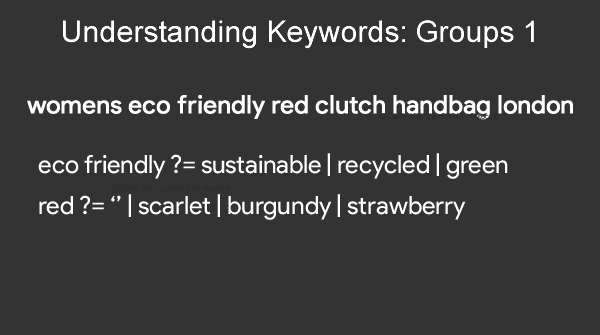
There’s more to keywords! Keywords are a bridge -between the User and the Search Engine!
You need to understand Nature, Intent, Parts of Speech, and how they pertain to the Journey Stage, SERP Features, etc. You need to see ways to utilize that information in your content.
What are the things needed to do Keyword Research?
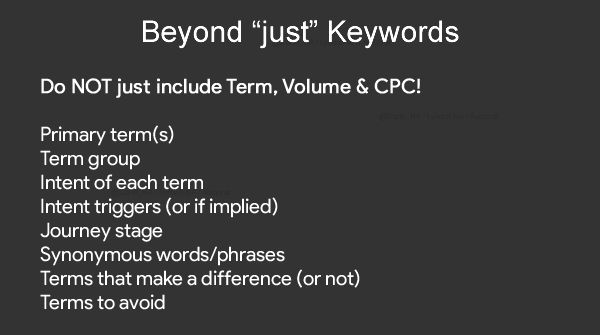
Change your research, the docs, and the reports you make.
Do NOT just include Term, Volume & CPC!
Include:
Primary term(s)
Term group
The intent of each term
Intent triggers (or if implied)
Journey stage
Synonymous words/phrases
Terms that make a difference (or not)
Conclusion:

You will find SEO life gets much (much!) easier when you capture/attach the additional information. From prioritizing targets through to ideation, identifying internal link targets, etc. So, give it a go. Go Beyond “Keywords”.

Director of Digital Marketing | NLP Entity SEO Specialist | Data Scientist | Growth Ninja
With more than 15 years of experience, Loveneet Singh is a seasoned digital marketing director, NLP entity SEO specialist, and data scientist. With a passion for all things Google, WordPress, SEO services, web development, and digital marketing, he brings a wealth of knowledge and expertise to every project. Loveneet’s commitment to creating people-first content that aligns with Google’s guidelines ensures that his articles provide a satisfying experience for readers. Stay updated with his insights and strategies to boost your online presence.
